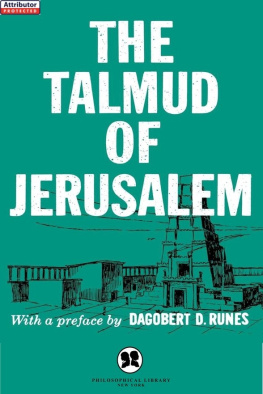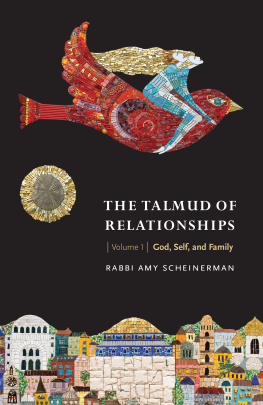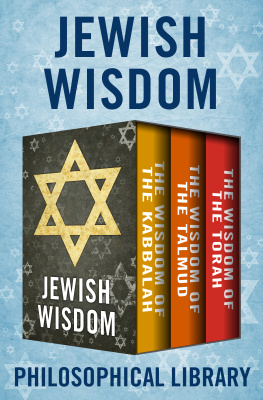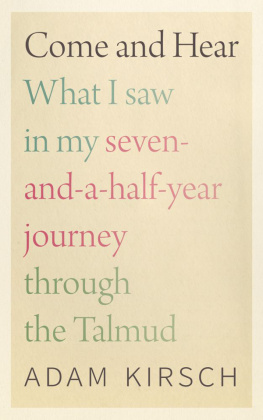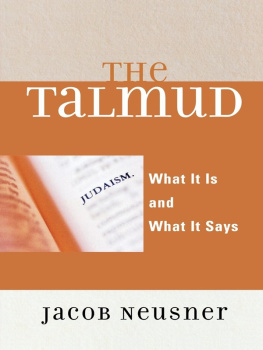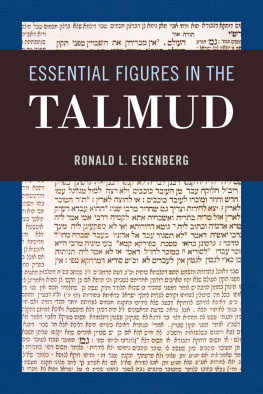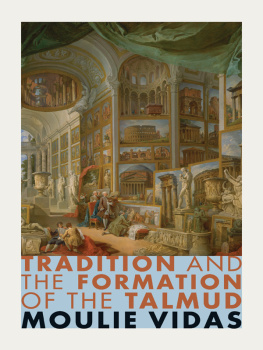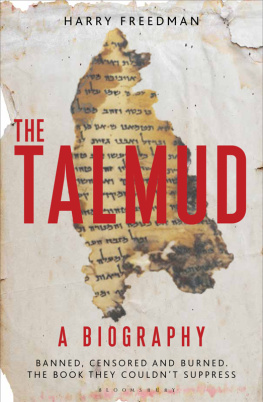EXPLORING JEWISH ARTS AND CULTURE
Robert H. Abzug, Series Editor
Director of the Schusterman Center for Jewish Studies
Jews in the realms of the arts and culture have imagined extraordinary worlds and shaped dominant cultures in ways that are only now being fully recognized and studied. The books in this series, produced by established scholars and artists, will further this revelation and make substantive contributions to both scholarly and public understandings of art, drama, literature, photography, film, dance, music, foodways, cultural studies, and other expressions of humanity as filtered through the Jewish experience, both secular and religious.
Six Memos FROM THE Last Millennium
A NOVELIST READS THE TALMUD
By Joseph Skibell
University of Texas Press
Austin
Copyright 2016 by Joseph Skibell
All rights reserved
First edition, 2016
Requests for permission to reproduce material from this work should be sent to:
Permissions
University of Texas Press
P.O. Box 7819
Austin, TX 78713-7819
http://utpress.utexas.edu/index.php/rp-form
LIBRARY OF CONGRESS CATALOGUING-IN-PUBLICATION DATA
Skibell, Joseph, author.
Six memos from the last millennium : a novelist reads the Talmud / by Joseph Skibell. First edition.
pages cm (Exploring Jewish arts and culture)
ISBN 978-1-4773-0734-2 (cloth : alk. paper)
ISBN 978-1-4773-0735-9 (library e-book)
ISBN 978-1-4773-0736-6 (non-library e-book)
1. TalmudBiography. 2. TannaimBiography. 3. AmoraimBiography. I. Title. II. Series : Exploring Jewish arts and culture.
BM501.15.S55 2016
296.1'20092dc23
[B]
2015020373
doi: 10.7560/307342
For my uncle
Richard Skibell
and in memory of my uncles
Leslie Lezan
Bernard Skibell
and
David Skibell

CONTENTS
A NOTE ON THE TITLE
ITALO CALVINO SPENT THE BETTER PART OF 1985 PREPARING to deliver the Charles Eliot Norton Lectures at Harvard. The great Italian novelist died before he could present his talks, and though hed completed only five of the six lectures he had planned, the work was published the following year under its intended title, Six Memos for the Next Millennium.
According to the Hebrew calendarwhich, unlike its Gregorian counterpart, moves in only one directionthe current year is 5776. In other words: were deep into the sixth millennium.
The Talmud was closed, by its editors, around 4235 (475 CE), and with Calvino in mindhis playful erudition has long been a beacon for meIve come to think of the stories I discuss in this book as memos from an unnamed writer working in the hinge-time between the fourth and fifth millennia.
Hence: Six Memos from the Last Millennium.
And in deference to the tradition created unintentionally by Calvinoa cosmicomic bakers half-dozen in reverse: five pieces for the price of sixIve included only five chapters here.
ACKNOWLEDGMENTS
AS I WAS FINISHING THIS BOOK, I WAS STRUCK BY how many friends said to me, Yeah, you were working on that when I met you. It has been over a decade since I made the commitment to live with these stories. Im grateful for the friends, relatives, students, and colleagues with whom Ive studied and explored these tales, in conversation, in a private study group, and in classes at Emory University, the Michener Center for Writers at the University of Texas, Congregation Agudas Achim in Austin, and the Young Israel of Toco Hills. Their insights have deepened my appreciation and understanding of these texts. Arthur Kurzweil gave me the right words of encouragement at exactly the right time, and Andrea Cohen-Kiener, the books first reader, buoyed the project up with her enthusiasm, as did Reuven Travis. Karmi Ingber generously offered a comprehensive critique. (All errors in the texts, of course, are mine.) Im grateful also to Robert H. Abzug, its second reader and its guardian angel, and to Jim Burr and Dave Hamrick at UT Press for taking a chance on a book that doesnt easily fit into any publishing category. The Bill and Carol Fox Center for Humanistic Inquiry provided me with the time and the quiet in which to prepare the final drafts. Arianna Skibell, a generous and talented editor, is a constant source of inspiration for me, and Im especially grateful to Barbara Freer Skibell, who has spent as many years living with these stories as I have. Her fine mind, her open heart, and her questing spirit inform every page.
A NOVELIST READS THE TALMUD AN INTRODUCTION
ONE EVENING, I WENT TO MY TALMUD CLASS. IT WASNT a large class, maybe four or five men, but that night, for whatever reason, I was the only student there. Id come to the study of Talmud relatively late in life, beginning in my mid-thirties. The Judaism Id been served up as a kid had been a pretty thin gruel, and I spent most of my young adult life looking for wisdom elsewhere: in literature and art, in rock n roll, in Eastern and Western philosophy, in mythology, in depth psychology.
Despite the richness I found in each of these, my hunger for meaning persisted, andnavely perhapsI approached the Talmud, the repository of thousands of years of ancient wisdom, as a seeker might, crossing into its sacred precincts with the hope of finding a kind of livable transcendence there, a way of fusing the mundane hours of earthly life with a cosmic sense of holiness and wonder.
I was particularly interested in the storiesthe anecdotes, allegories, fables, legends, and tall talesin the Talmuds five thousandplus pages. As a novelist, I spend my days steeped in stories. Stories are the doorway into meaning for me, the royal road into consciousness. Sacred stories even more so, I thought. My teachers, however, either skipped over these tales or sprinted past them quickly, and certainly they received none of the time and attention, the almost scientific dissection, we gave, as a class, to the Talmuds legal arguments.
I didnt share my teachers reluctance to linger in these parts of the text, and I devised my own plan to study them. I decided to move through Ein Yaakov (The Well of Jacob), the volume in which these stories are collected, starting with the section of the Talmud we were then studying in class. (The Talmuds 517 chapters are collected in 30-some sections usually called tractates in English.) The tractate was Bava Kamma (The First Gate), and the first story that piqued my interest there concerned a figure named Ulla.
According to the story, when the daughter of a Babylonian rabbi dies, his colleagues decide to pay him a condolence call. They invite Ulla along, but Ulla will have none of it.
What does your Babylonian method of consolation have to do with me? he says to them. Its completely blasphemous! When you all make a condolence call, you say, What can be done?meaning What can be done against the will of the Holy One?suggesting that if something could be done, youd do it; and what is more blasphemous than that?
Instead Ulla visits Rav Samuel on his own. Offering words of consolation, he quotes an oddly chosen passage from the Torah, reminding the bereaved father that The Holy One said to Moses: Do not oppress Moab and do not wage war against them.
Now, if these words seem far from the point to the grieving father, it doesnt matter. Ulla is happy to elaborate upon them, and he sketches out a complicated argument involving the ancient Hebrew wars and the messianic future, and conversations between the Holy One and his prophet Moses, before arriving at his conclusion: Were your daughter righteous and worthy of righteous descendants, she would have been spared.
Next page

